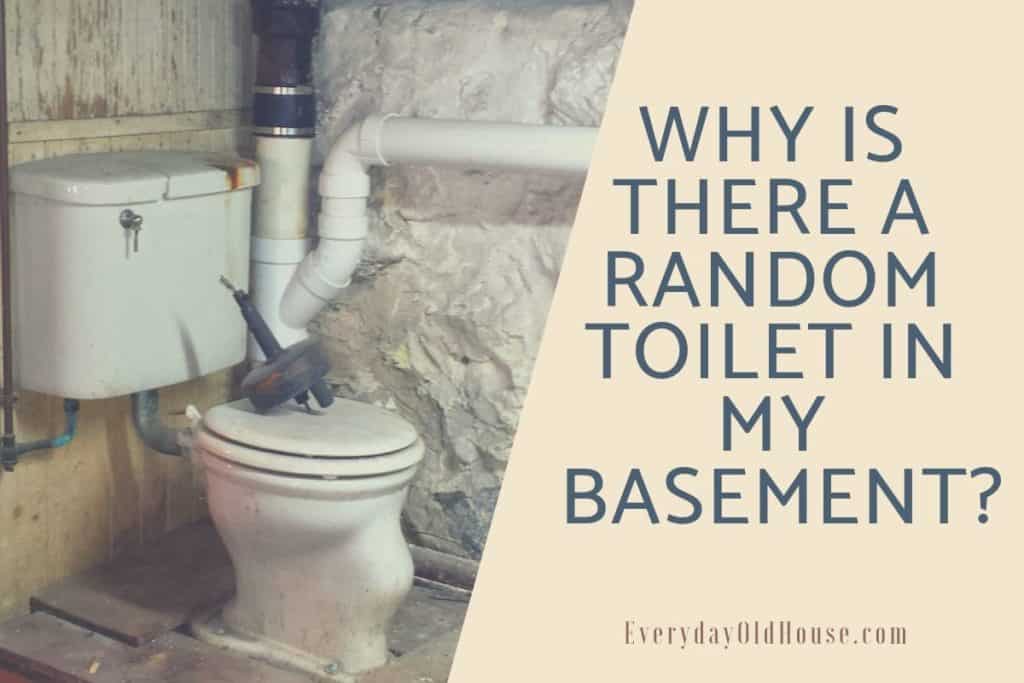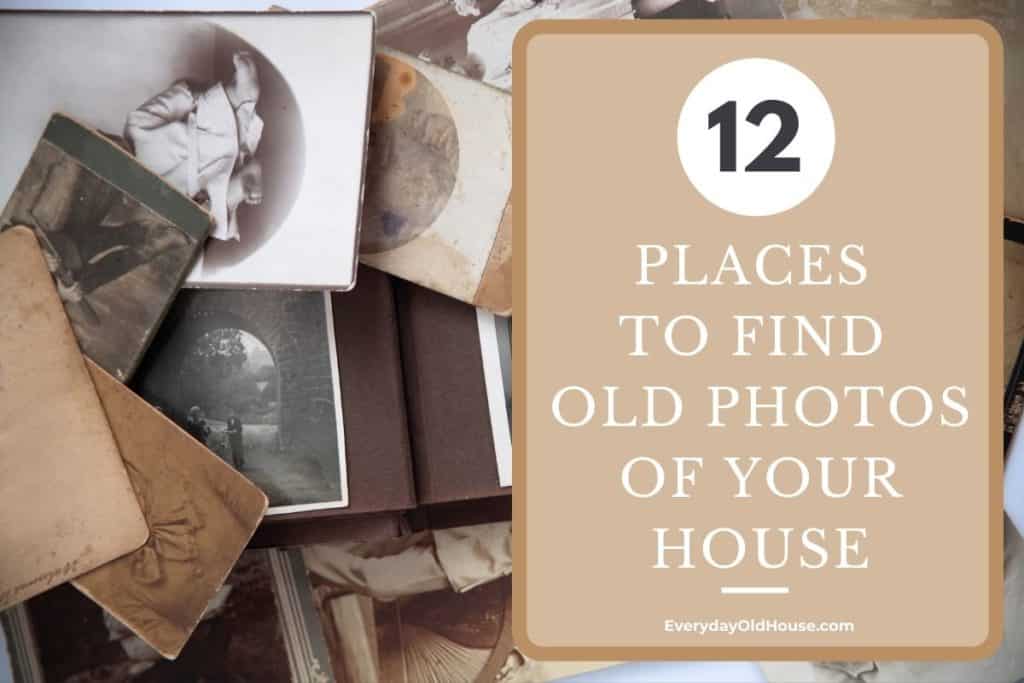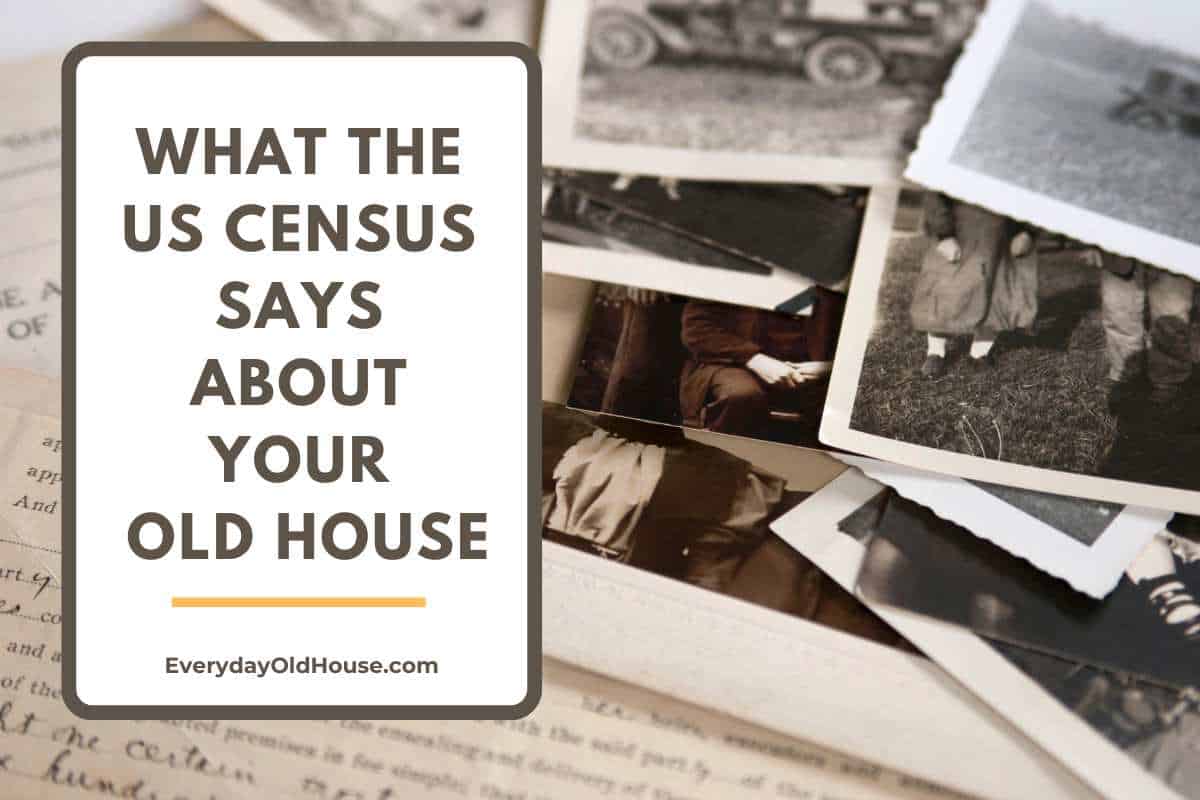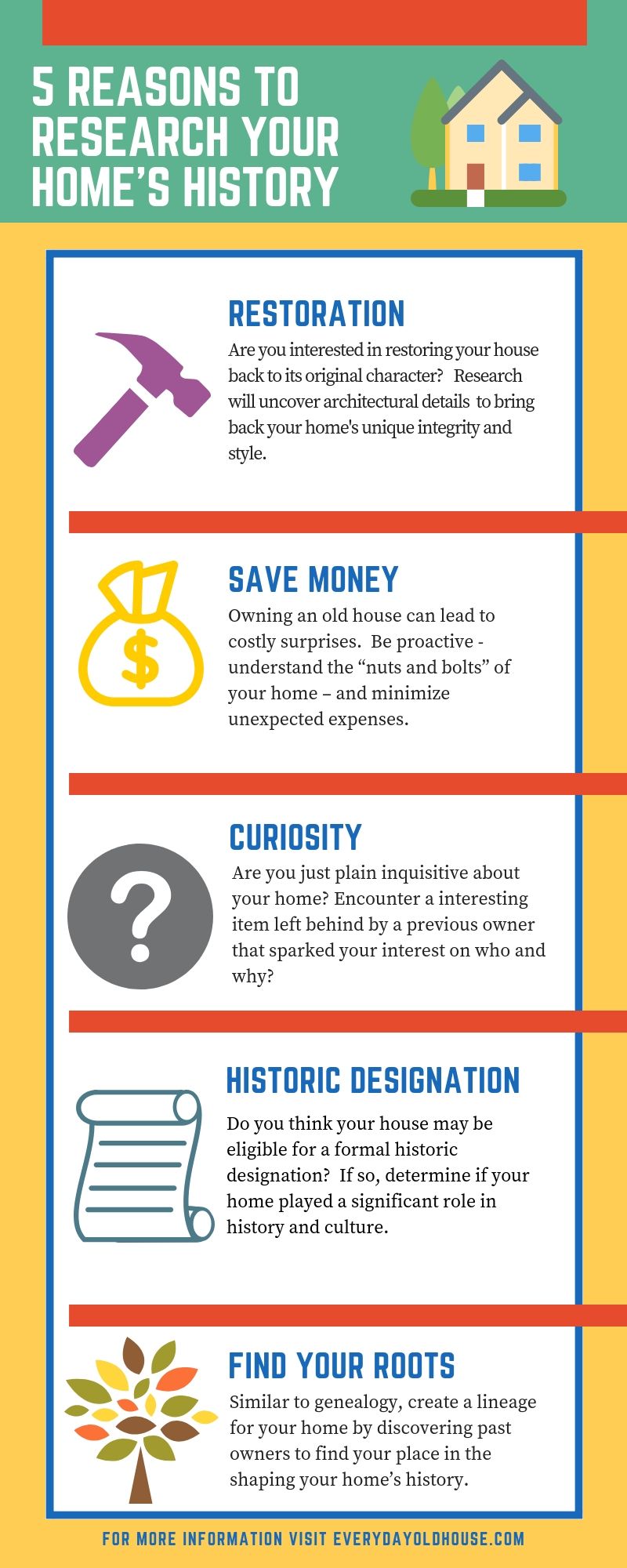Last Updated on April 18, 2024
Have you ever wondered about your history of your house? Wondered when it was built? Did it always look like this? Who owned it and what were they like? If you are a curious-sort (like myself), you might looking around your old house and asking a lot of questions. But is it worth the time to dive into a history of your home? What’s the point? I’d argue that there are 5 compelling benefits of researching a home’s history.
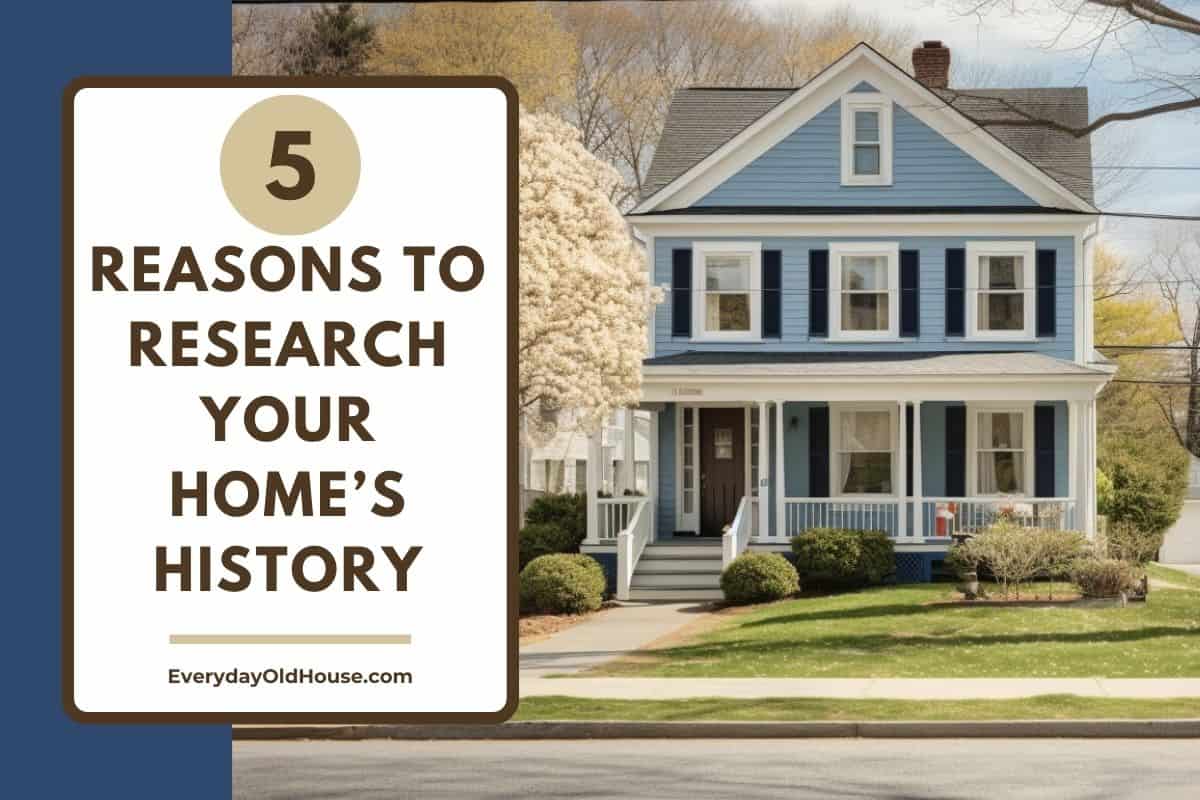
Backstory
My husband and I purchased our first house together in 2012 – an American Foursquare built in 1916. And like most homeowners of old houses, we have encountered some interesting remnants left by past occupants. A random Vodka bottle well hidden in the attic rafters. Toy trucks buried in the back of the garden. Broken white subway tiles under old decking.
(My personal favorite was a declaration of “I love you Michael Jackson 1984” in bright pink bubble cursive hidden way in the back of a bedroom closet.)
And of course it triggered our curiosity of past owners. About who they were. And why they had done some of the things they had done to the house (including our very random basement toilet).
Benefits of Researching a Home’s History
When our old house turned 100 years old in 2016, not only did we decide to throw it a birthday party (’cause, yeah, we are those people), I decided to start researching the history of my house.
While the motivation for me to research was curiosity (aka Reason #3), I realized that there are other benefits of researching a home’s history, such as:
- Rehabilitation
- Historical Designation
- Curiosity
- Connection
- Save Money
Some reasons to research a historic home are practical and can show tangible results (i.e. save money) while others benefits of researching a home’s history possess lean more toward emotional sentiment (i.e. fostering a connection).
I’m still in the process of learning about my house’s past and its previous occupants. As I gather little nuggets of information, I’m starting to piece together my house’s story. And this unraveling story presents even more character to my old house, and helps me embrace its quirks.
1. Rehabilitation
Unfortunately, many older homes have been stripped of their original charm and renovated to the “style of the moment” by previous owners. A Victorian home with icky brown paneling over the walls. A Craftsman home with vinyl flooring. You catch my drift. UGH.
For those homeowners who are looking to infuse historical charm back into their old houses, one of the benefits of researching a home’s history to discover the timeline of their old house. Researching a house’s architectural history enhances appreciation for its evolution. From the original design to subsequent modifications, you’ll gain insight into the changes of your home’s aesthetics and functionality over the years.
First, starting with building permits to unearth the home’s construction dates, original configuration and architectural styles. And then, documenting what features changed in the house over time. Which rooms have always been in same place, and which have have been re-configurated or even added.
By gaining an insight into a home’s architectural timeline, homeowners have the ability to bring back some of the original integrity and style. Or, if some of the original charm is still present, rehabilitations are a thoughtful blend of tradition and modernity. Modifications will preserve the historical integrity of the house for future generations to enjoy while still making it relevant for contemporary living.
Commonly homeowners end up performing rehabilitation of their old houses (not a restoration, which is quite different as further detailed in Restore vs. Renovate vs Rehab). Rehabilitations is the best way to combine modern conveniences while still retaining their home’s historic character. For example, the kitchen in a Queen Anne house that has modern conveniences (e.g. dishwater) with free-standing and movable cupboards.
It encourages homeowners to integrate historical elements into renovations, ensuring that updates align with the house’s unique character. By combining the best of the past and present, occupants contribute to architectural innovation.
2. Historic Designation
One of the most compelling benefits of researching an house’s history is determine it’s eligibility for a formal historic designation. There are a variety of historic designations for historic buildings through local, state (State Historic Preservation Offices), and national (National Register of Historic Places) levels.
In general, in order to be eligible for a historic designation, most programs require an old house to demonstrate a significant connection to history, person, or architecture. For areas with a cluster of historic buildings, there is the potential to be designated as a historic district. What a great place to live, right? A historic district in your local community filled with vibrant old houses!!!
Researching the history of a house could uncover its significant role in history or culture. Perhaps through research at your local library you will discover that it was a stop on the Underground Railroad! Or childhood home of a famous athlete. Or, perhaps the house has architectural significance – for example, the only example of an Italianate home in the area of a historic district?
In addition to formal recognition and personal pride of owning a historic home listed on a historic register, there are a host of other potential benefits, such as:
- Financial incentives via tax-credits
- Technical assistance from experts
- Special exemptions from building codes
3. Curiosity
Are you just plain inquisitive about your historic house? Are you curious about the physical aspects of the house? For example, wondering why the room off the kitchen looks a bit different from the rest of the house? Come across something weird during your renovations?
Or are you less interested in the physical history of the house, and more interest in the social history of the house? The past occupants. What were they like? Did they have accomplishments? What were their occupations? Decorated soldiers of war or conscientious objector? Freed slaves? Local politicians? High society matrons? What were the children like who grew up here? What interesting facts can you uncover with a house history? And that somewhat somber question – Did someone die here? (I don’t want to know that answer for my house….)
BEGINNER’S GUIDE TO HOME HISTORY RESEARCH
Interested in researching the history of your old house but unsure where to start? Grab my newly-release:
Beginner’s Guide: How to Trace the History of Your Old House
This 60-page guide takes you step-by-step through 25+ online and in-person resources to create a picture of your home’s history.
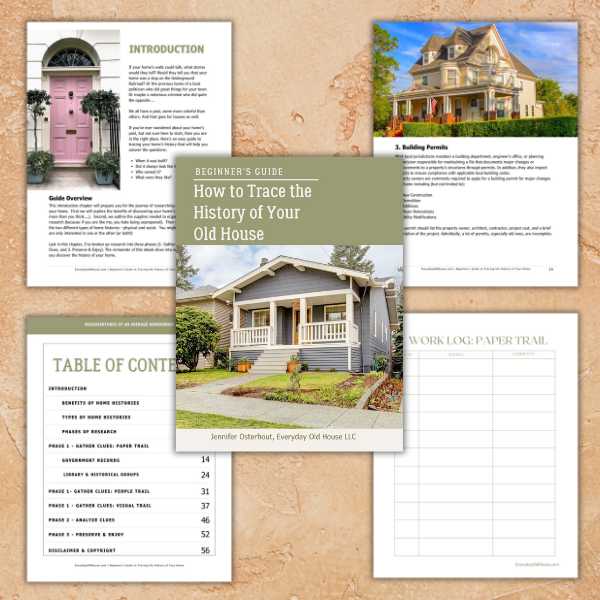
4. Personal Connection
Genealogy is the second most popular hobby in the US (after gardening). Discovering your roots and creating a connection with family through digging into records at the local library like census records, historical maps and old newspapers, brings personal meaning and emotional bond to so many.
And some homeowners apply this same approach to finding meaning through genealogy of the past owners of their old houses. Why not unearth the roots literally in your own backyard? Discover the names and life stories of past stewards of an old house through census records?
What better way to learn how to appreciate the character and charm of a home’s past by getting to know it’s previous occupants better by tracing property ownership?
As said in the book Why Old Places Matter, “in a world that is constantly changing, old places provide people with a sense of being part of a continuum, which is necessary for them to be psychologically and emotionally healthy.”
And by knowing the past, a homeowner of an old house develops a deeper appreciation for the stories that unfolded within its walls. This knowledge instills a sense of stewardship, encouraging homeowners to preserve and pass down the property’s legacy to future generations.
5. Save Money
Researching the physical history of an old house provides a better understanding of the condition of historic buildings materials, finishes, and utilities. For example, when was the electrical system updated? Is asbestos or lead-based paint still present? Was this bathroom previously a closet?
Owning an old house can lead to costly surprises. Knowing the “nuts and bolts” of your historic house can help you develop a proactive strategy.
The more you understand your historic home’s condition, the more likely you will avoid costly surprises. With this information, homeowners can develop a more accurate budget and timeline for major projects and regular maintenance.
Researching the history of your property is a proactive strategy to lower the chance of surprises, renovation delays and costly overruns.
Otherwise you might find yourself constantly reacting to surprises. And opening your wallet. And let’s face it, nobody wants to be in that situation….
Read to get started researching the history of your house? If so, check out my Beginner’s Guide to Tracing Your House’s History, a comprehensive guide for beginners on how to find and review a variety of resources, including census records, historic maps, old newspapers, and local library resources.
Photo credits: Jessica Furtney via Unsplash
Related Posts
Want to be the first to know about new posts? Be sure to follow me on Pinterest, Facebook, Instagram or Twitter of even Etsy! Or better yet… Subscribe below!
My monthly (admittedly sometimes more, sometimes less….) emails are like receiving a unexpected letter from an old friend WITHOUT needing to put on your slippers and walk out to your mailbox…. See? I got ya, my friend!)
[Note: My posts are proudly connected to these amazing link parties full of DIY ideas and inspiration!]
